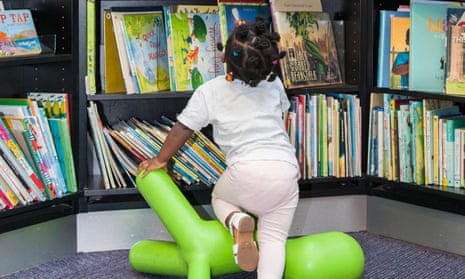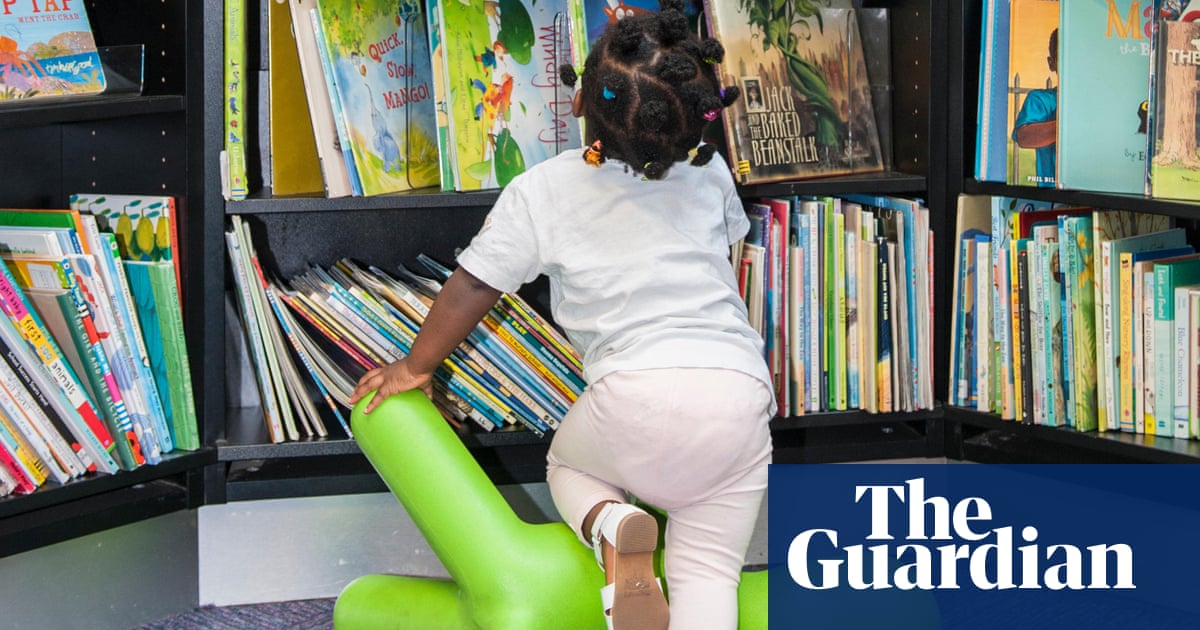
World Book Day finds children are put off reading for pleasure
Annual event to encourage young readers has revealed research finding that significant numbers feel discouraged from following their own tastes
As World Book Day runs its annual event to promote reading for pleasure among children, it has revealed new research showing that more than a third of children cannot choose what they want to read, and one in five feel judged for what they do read.
“Children have told us that they think that reading choices are judged by the adults around them,” said Cassie Chadderton, CEO of World Book Day. “It discourages them, it puts them off reading for pleasure and by choice”.
The survey of 1,000 7- to 14-year-olds in the UK – conducted by consultancy Beano Brain in January – also asked children about their parents’ hobbies. Only 25% of children said their parents relax by reading at home, while 56% said their parents scroll on their phones and 52% watch TV. “Adults usually tell you to read, but then they go on their phones,” one 11-year-old “non-reader” told researchers. “My teachers and my dad do that!”
More than a quarter of respondents said that they would enjoy reading more if it was made more fun (30%) and if there was less nagging from grownups to do it (28%). One in four children said they are encouraged to read books that they do not want to read.
“I have had a child in the classroom who had the book they wanted me to see they were reading and, underneath that, the book they wanted to read,” said Alice Read, a teacher at Buckingham primary school in Hampton. “They’re hiding them away. It’s important to see that it’s a valuable book, it might be one that’s giving them comfort, their easy read, or has characters they relate to. It’s important as practitioners in the classroom that we’re not voicing our opinion about whether it’s a book you ‘should’ be reading.”
The survey results and campaign come just over a week after a report commissioned by the National Literacy Trust highlighted a “literacy crisis” that could be costing the economy £830m per year group. It identified 106,000 five-year-old children in England each year who are not currently meeting the expected standard but could with adequate support, two-fifths of whom lived in deprived areas. The report coincided with the launch of an NLT campaign, Early Words Matter, offering literacy support to 250,000 children in areas worst-hit by the cost of living crisis.
Fiona Evans, director of school programmes at the NLT said 40% of 11-year-olds from disadvantaged backgrounds are leaving school without reaching the expected levels for reading. Meanwhile, more than half of children don’t enjoy reading in their free time – “the lowest levels of enjoyment we’ve seen in almost two decades”.
“All of this contributes to low literacy levels, particularly for children and young adults who are experiencing poverty,” added Evans. “Without these literacy skills, it’s hard for them to live the life they want. It can mean starting school already behind, lower GCSE results, even affecting employment well into adult life.”
The World Book Day campaign, called Read Your Way, will also see the charity working with 20 libraries in areas of high deprivation to encourage reading for pleasure. “I was hearing about the work of Newham libraries yesterday where 44% of the children in that borough are in poverty,” said Isobel Hunter, CEO of Libraries Connected. There are “millions of children whose families can’t afford to buy books at home, so having access to the library, and the library being able to focus on additional support for those families, is really important.”
There is not a statutory requirement for schools to have a library, said Chadderton. One in seven primary schools don’t, rising to one in four in disadvantaged areas. Hunter said libraries are crucial in promoting reading for pleasure because they allow children to choose from a “massive range” of books. “At school they may have certain books that they’ve got to read,” whereas the library is “about the child really discovering its own interests”.
after newsletter promotion
Libraries across the country are being threatened with budget cuts or closure to services as councils face major financial struggles. Last week, a Local Government Association survey found that just under half (48%) of councils said that they would have to make cuts to their library services. Councils plan to make these savings by reducing hours of operation and staff numbers, with some closing entirely.
“What we’re talking about here is libraries not just making little trims around the edges. It really is severe cuts where local residents will notice a massive difference to services,” said Hunter. The cuts may include “branch closures, loss of staff, reduction in book-buying, activities not happening anymore”.
Hunter said libraries can help solve some of the “pressing social problems” caused by the pandemic and the cost of living crisis, such as early years education and literacy, getting children ready for school, and supporting disadvantaged families and children. “We’re at a point where libraries can really, really help” with some of these problems, but “it’s also a point at which, unfortunately, they’re going to be starved of funds, and they’re going to have to contract.”

